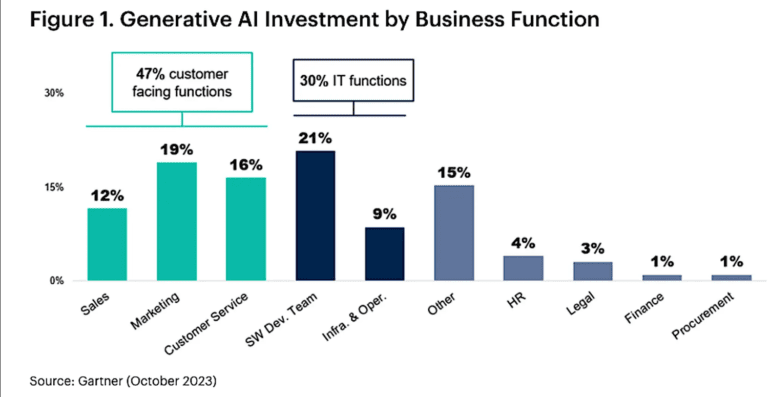TL;DR:
- Gartner poll reveals a threefold increase in organizations piloting generative AI (genAI) and doubling in those in production.
- 45% of organizations are running genAI pilots, with 10% in production, marking significant growth.
- GenAI investments are scaling across multiple business functions, with software development, marketing, and customer service leading.
- 78% believe the benefits of generative AI outweigh its risks, up from 68% in an earlier poll.
- Gartner predicts over 50% of software engineering leaders will oversee genAI development by 2025.
- Google Cloud’s survey highlights developers’ enthusiasm for AI tools and their potential in various tasks.
- The impact of AI on teams is still evolving, with questions about its effects on group-level outcomes.
- GenAI won’t replace developers but can automate aspects of software engineering and enhance efficiency.
- AI-enabled skills management can support talent and work processes, allowing leaders to create new roles and eliminate redundancies.
Main AI News:
In a recent Gartner poll, the adoption of genAI technology for pivotal business processes has surged, coinciding with a pronounced enthusiasm among developers for AI tools, as per a Google Cloud survey. This dynamic transformation in the tech landscape has been unveiled through a comprehensive poll involving over 1,400 executive leaders.
The Gartner Research survey showcases a remarkable threefold increase in organizations initiating generative AI (genAI) pilot programs, with a concurrent doubling in those who have transitioned this technology into full-scale production. According to the survey, an impressive 45% of organizations are actively running genAI pilot programs, with an additional 10% successfully integrating genAI solutions into their production processes. This surge is a significant leap from an earlier poll conducted in March and April 2023, wherein a mere 15% of respondents were engaged in piloting generative AI, and a meager 4% had made it to the production phase.
Frances Karamouzis, a distinguished vice president analyst at Gartner, notes, “Organizations are not just talking about generative AI; they’re investing time, money, and resources to move it forward and drive business outcomes.” This newfound commitment is underlined by the revelation that 55% of organizations have increased their investments in generative AI since its emergence ten months ago, marked by the public introduction of ChatGPT.
Furthermore, 45% of those surveyed are scaling genAI investments across multiple business functions, with nearly half of them (22%) deploying the technology across various operational areas. Software development, marketing, and customer service (with the integration of chatbots) are the domains experiencing the highest rate of genAI adoption and investment.
The poll also highlights a growing confidence in generative AI, with 78% of respondents now believing that the benefits of this technology outweigh its associated risks, marking an increase from the earlier poll’s figure of 68%.
Gartner’s predictions for the future are equally compelling, as they foresee that more than half of leadership roles in software engineering will necessitate overseeing genAI development by 2025. This prediction aligns with findings from the recently released 2023 Accelerate State of DevOps Report by Google Cloud’s DevOps Research and Assessment (DORA) team.
The DORA report, based on the input of nearly 3,000 technology professionals across diverse industries worldwide, underscores the significance of AI in a multitude of tasks, ranging from data analysis, security analysis, code generation, and log analysis to bug identification. Derek DeBellis, DORA research lead, emphasizes the prevailing enthusiasm for AI development tools, noting that “a majority of respondents are incorporating at least some AI into the tasks we included in our survey.” However, he also cautions that the full impact of AI development tools on teams is still in its nascent stages, and their widespread adoption may take time.
The Google Cloud survey, sponsored by Digital.ai, raises questions about the effects of AI on software teams, suggesting that while AI may have a slight positive impact on individual well-being measures, its influence on group-level outcomes remains uncertain.
On a cautious note, Haritha Khandabattu, a senior director analyst at Gartner, emphasizes that genAI will not replace developers in the near future. Instead, it possesses the capability to automate specific aspects of software engineering, enhancing efficiency and allowing managers to allocate more time to the human-centric dimensions of their roles. GenAI can expedite recruitment and hiring tasks, such as job analysis and interview summary transcriptions.
Conclusion:
The remarkable surge in genAI adoption, as evidenced by the Gartner poll and developer enthusiasm, signifies a pivotal transformation in the business landscape. Organizations are actively investing in and deploying generative AI, recognizing its potential for transformative impacts across various sectors. This trend is expected to continue, with AI becoming an integral part of software engineering and business operations. Businesses that embrace this technology are poised to gain a competitive edge in the evolving market.

